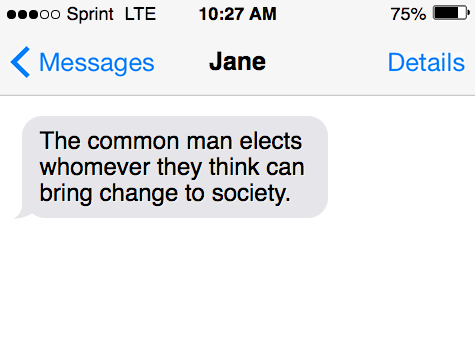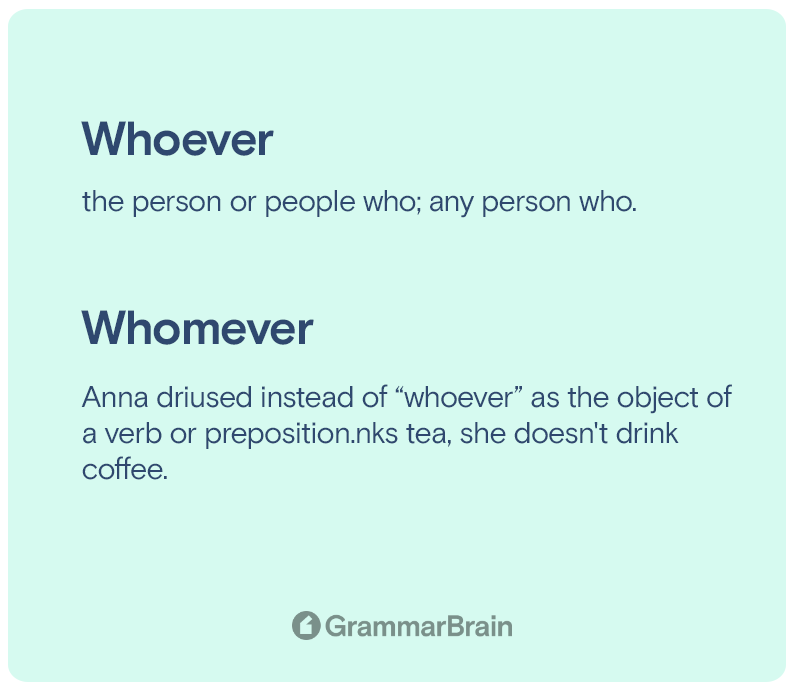What is the difference between whoever vs. whomever? And why are these words commonly mistaken for each other? Both words refer to people. And have an effect on the verbs and nouns that surround them.
Learn the difference between these two words in this short English grammar worksheet…
What does “whoever” mean?
“Whoever” is synonymous with “he” and “they.” All three words find their use as the subjects of verbs. Whoever is a subject pronoun. It often acts as the subject of a sentence or clause.
- For example: “Whoever reads the meaning of a subjective pronoun understands it.”
See the definition for “whoever” in the table below.
| Word | Definition |
| Whoever (pronoun) /ho͞oˈevər/ | the person or people who; any person who. |
What does “whomever” mean?
“Whomever” can is synonymous with “him” and “them.” All three words relate to objects. Whomever, the word, is an object pronoun. It has use as a redirect to the object of sentences, clauses, and phrases.
- For example: “Mary will recommend whomever John suggests.”
See the definition for “whomever” in the table below.
| Word | Definition |
| Whomever (pronoun) /ho͞omˈevər/ | used instead of “whoever” as the object of a verb or preposition. |
Difference between a subject pronoun and an object pronoun
Let’s learn the difference between a subject pronoun and an object pronoun.
Subject pronoun
Subject pronouns are those pronouns performing an action in a sentence.
Examples of subject pronouns are I, you, he, she, we, they, and who.
Any noun which performs the highlighted action in a sentence structure, as in the case of these pronouns, is a subject. The resulting phrase is deemed a subjective case.
In English grammar, the subject must precede the verb in a sentence (an exception to these would be a sentence formed as a question).
An example of this would be:
- “I bake cakes for my colleagues every Wednesday”
In the above sentence, “I” is the subject (subject pronoun) that performs the ‘baking’ action (verb).
To check for the correct use, replace ‘I’ with any other subject pronoun. Then, make a modification of the verb by the person/number of people performing it.
This results in a sentence having clarity.
This is unnecessary in a simple declarative sentence and helps form more complicated sentences.
Note that the subject pronoun always represents the actors in sentence formation. If an action is performed, use subject nouns.

Which one of them is grammatically appropriate? Is it “whoever” or “whomever?”
In the cases of ‘him’ and ‘whomever,’ they are both object pronouns and have the inclusion of the ‘M’ letter.
If it’s possible to replace ‘whomever’ with the appropriate form of ‘him/her,’ the resulting sentence structure would be correct.
This is an easy way to remember which word form to use.
If it’s necessary to use ‘he’ to make the sentence grammatically correct, use ‘whoever.’
In conversational or informal speech and text, it is typical for ‘whoever’ to get used in place of ‘whomever.’
It is analogous to when ‘who’ is often used instead of ‘whom.’

Overusing “whomever”
Generally, writers believe that using “whomever” as a baseline will elevate their writing. ‘Whomever’ and ‘whoever’ find synonymy with each other. Meaning, they get used interchangeably.
But, grammatically, this use isn’t always correct. Using the wrong whoever/whomever often leads to a conclusive display of poorly written English. It’s important to use the correct word when forming sentences.
In the case of formal writing and speech:
Many writers mistakenly think ‘whomever’ as the sophisticated form of ‘whoever.’
The general idea is that writing ‘whomever’ makes the impression of being better educated.
But in cases of improper use, this mistake results in the exact opposite impact, leading to a conclusion of the user being grammatically less informed.
Both whomever/whoever can find their way into formal writing. It is not specific to a writing tone.
How to reduce the grammatical error occurrence:
To avoid confusion, ‘whomever’ is seldom used correctly.
Focus on using ‘whoever.’ In most cases, they are both subject and object pronouns.
Although by using ‘whoever’ as your backup or “go-to” word choice, you’re reducing the chances of using the incorrect word.
Whoever and whomever indicate that the speaker is unaware of the identity of the subject/object mentioned in a sentence.
Sentences that use whoever and whomever focus more on the verb or verbs surrounding it. This puts less focus on the determination of the individual’s identity.

“Him” trick to remember which to use
The “Him” technique is one of the techniques that can make it easy to determine whether to use whoever and whoever.
Replacing ‘m’ in whomever with the ‘m’ in him usually results in a rectified sentence.
Then whoever/whomever, him/her can replace it depending on the gender and number of individuals.
For example, “The cake gets delivered to whomever ordered it early in the morning.” Or, “the cake goes to him“
Is it a meaningful sentence? Is it correct from a grammar perspective? If yes, then whomever is appropriate to use in the sentence structure. Suppose the answer is otherwise, whoever should get used.
Similarly, using her/them interchangeably for the other gender/more is an easier way to prevent grammar errors, too.
The “Him” trick works in most cases as whomever is an object pronoun. Whoever is a subject pronoun.

Sentence examples for “whomever”
Now let us explore some examples of whomever :
- Misha could marry whomever she insists.
- Give the chocolates to whomever you think deserves them.
- You can accompany whomever you feel comfortable with to the marriage procession.
- I will give a week-long vacation to whomever we notice having a positive appraisal.
- Jessica will award the bonus to whomever she believes deserves it the most.
- I keep a lasting impression on whomever I work with.
- The writer donated his royalty to whoever supported him through his hardships.
- I’ll assign projects to whomever the boss invites into the meeting.
- The common man elects whomever they think can bring change to society.
In each sentence, the reader can determine whomever is grammatically correct. This is because here, the pronoun is not the subject of the phrase. It is also not performing an action on the verb but does affect them.
Note that there are no active verbs in these examples. But in these instances, there is the precedent of verbs.
Generally, the subject also performs the verb action placed after whomever.
Sentence examples for “whoever”
Now let us explore examples of whoever:
- Whoever attends the meeting in the first hour should write the meeting minutes.
- Whoever eats the most has to pay the bill alone.
- Whoever wants to go to the amusement park should catch the school bus now.
- The prize should be given to whoever wins the race.
- Whoever defeats Harry in the presidential elections should be the speech representative of the committee.
- Whoever wants to eat the entire bowl of soup can have it.
- It seemed as if whoever had lived here had catholic tastes.
- Whoever is responsible for this mess can clean it up in an instant!
Whoever is generally the first word of the sentence. And typically, it requires to precede the sentence’s verb—sentences with whoever almost always contains a dependent clause.
Can you start a sentence with “whomever”
A sentence can be started with whomever.
In most cases, this is uncommon. Use of whomever is possible at the start of the structure formation of the sentence. This is when whomever, that receives the action (verb) is placed at the beginning of a sentence.
This would be grammatically appropriate to begin a sentence using whomever in these cases.
Examples of this exception in sentence formation are:
- Whomever you select as the actor, it’s accepted by the crewmembers.
- Whomever you choose as the driver would be okay with me.
Can you start a sentence with “whoever”
In most cases, whoever can be used to start a sentence. But it’s more common to see it with a rarity fall in the middle of a sentence.
When that case occurs, it usually can get swapped with the choice of whomever.
Here are examples:
- Whoever made this painting is a real artist.
- Whoever visits us at Christmas is welcome for a lovely stay.
- Whoever breaks the chairs or tables in the classroom is in deep trouble.
- Whoever nominates the leader of the party in the meeting is going to be the kingmaker.
- Whoever drinks the most wins the beer-drinking competition.
- Whoever is the leader will show others the way.
When to use “whomever”
The speaker must use whomever at the time when the entire sentence is formatted to use him.
Example of when to use “whomever”
- “Please forward the document to whomever needed it”
- This translates to “Please forward the document to him/her.”
Here, whomever is represented as an object pronoun, where it points to the verb or preposition instead of the subject.
In the above example, the subject is the document while the object is the person who needed the document. H
ere, the verb forward, and the preposition to point to the individual that needed it. Whomever is the correct form of object pronoun in the sentence.
Other examples of when to use whomever in the sentences are:
- I will give extra candy to whomever eats ten.
- Professor Mary would like to have a meeting with whomever is available in the laboratory store.
- Kindly make sure the package gets delivered to whomever it’s mentioned.
- I would be glad to meet whomever drew this magnificent painting!
- The authorities plan to prosecute whomever trespassed on this wall.
When to use “whoever”
Whoever can be joined with pronouns such as I, we, he, she, and they, this. By doing this, it would show the action in the sentence when the subject is uncertain.
Depending on the purpose of whoever is in the sentence, repurpose whoever and use it in sentence formation.
Examples of when to use “whoever”
- Whoever arrives at the showroom first gets to book the car at a throwaway price.
- Whoever hits the bullseye on the darts gets the prize money.
- Whoever draws the painting in an hour wins the competition.
- Whoever tops the class gets fewer credit hours in coursework.
- Whoever wants the dress can request it.
What to do when confused between “whomever” or “whoever”?
To sort out which subject or object pronoun to use, you can try replacing the word in question.
Replace it with either he/she or him/her, and see which sentence reads clearer.
If he/she suits, use whoever.
If him/her looks grammatically correct, use whomever.

Sources
- “Whomever” vs. “Whoever”: What’s The Difference?
- Whomever or Whoever: Get It Right Every Time With This Simple Trick
- Whoever vs. Whomever: How to Choose the Right Word
- What Is the Difference between “Whoever” and “Whomever”?
- Whoever vs. Whomever: Which One Should You Use?
- Whoever vs. Whomever: When to Use Whomever or Whoever (with Useful Examples)
Inside this article
Fact checked:
Content is rigorously reviewed by a team of qualified and experienced fact checkers. Fact checkers review articles for factual accuracy, relevance, and timeliness. Learn more.
Core lessons
Glossary
- Abstract Noun
- Accusative Case
- Anecdote
- Antonym
- Active Sentence
- Adverb
- Adjective
- Allegory
- Alliteration
- Adjective Clause
- Adjective Phrase
- Ampersand
- Anastrophe
- Adverbial Clause
- Appositive Phrase
- Clause
- Compound Adjective
- Complex Sentence
- Compound Words
- Compound Predicate
- Common Noun
- Comparative Adjective
- Comparative and Superlative
- Compound Noun
- Compound Subject
- Compound Sentence
- Copular Verb
- Collective Noun
- Colloquialism
- Conciseness
- Consonance
- Conditional
- Concrete Noun
- Conjunction
- Conjugation
- Conditional Sentence
- Comma Splice
- Correlative Conjunction
- Coordinating Conjunction
- Coordinate Adjective
- Cumulative Adjective
- Dative Case
- Determiner
- Declarative Sentence
- Declarative Statement
- Direct Object Pronoun
- Direct Object
- Diction
- Diphthong
- Dangling Modifier
- Demonstrative Pronoun
- Demonstrative Adjective
- Direct Characterization
- Definite Article
- Doublespeak
- False Dilemma Fallacy
- Future Perfect Progressive
- Future Simple
- Future Perfect Continuous
- Future Perfect
- First Conditional
- Irregular Adjective
- Irregular Verb
- Imperative Sentence
- Indefinite Article
- Intransitive Verb
- Introductory Phrase
- Indefinite Pronoun
- Indirect Characterization
- Interrogative Sentence
- Intensive Pronoun
- Inanimate Object
- Indefinite Tense
- Infinitive Phrase
- Interjection
- Intensifier
- Infinitive
- Indicative Mood
- Participle
- Parallelism
- Prepositional Phrase
- Past Simple Tense
- Past Continuous Tense
- Past Perfect Tense
- Past Progressive Tense
- Present Simple Tense
- Present Perfect Tense
- Personal Pronoun
- Personification
- Persuasive Writing
- Parallel Structure
- Phrasal Verb
- Predicate Adjective
- Predicate Nominative
- Phonetic Language
- Plural Noun
- Punctuation
- Punctuation Marks
- Preposition
- Preposition of Place
- Parts of Speech
- Possessive Adjective
- Possessive Determiner
- Possessive Case
- Possessive Noun
- Proper Adjective
- Proper Noun
- Present Participle
- Prefix
- Predicate



